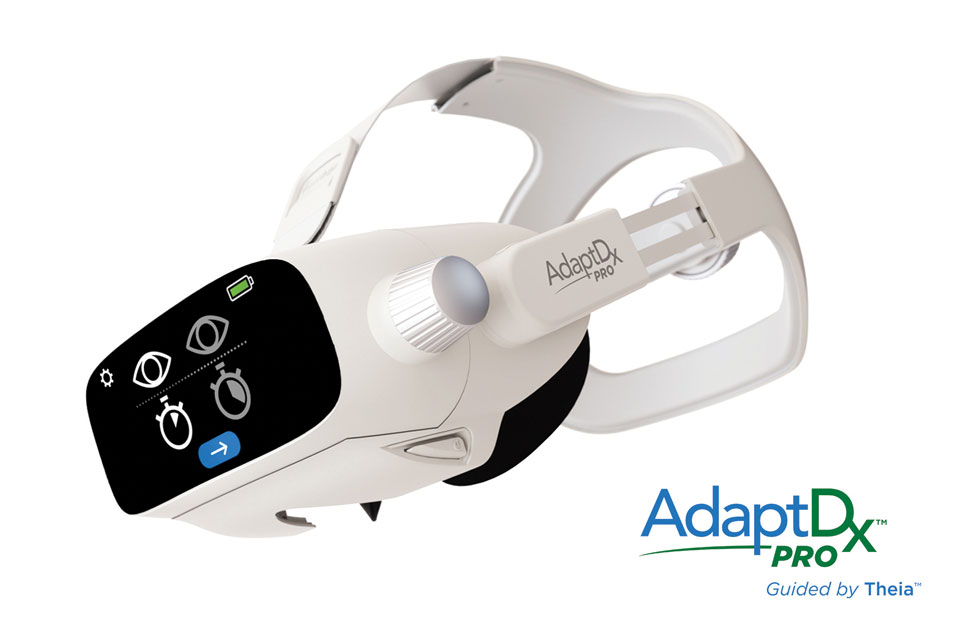- OT
- Industry
- Equipment and suppliers
- Welcome to the future of AMD
Advertorial
Welcome to the future of AMD
AI-driven Theia helps catch age-related macular degeneration simply and affordably in any practice environment


Advertorial content is paid for and produced by a sponsor, and is reviewed and edited by the OT team before publication.
09 March 2020
The original AdaptDx® automated dark adaptometer was introduced in 2014 and has since been used by more than 1000 eye care professionals worldwide to identify and monitor age-related macular degeneration (AMD). In this short time, dark adaptometry has lessened the profession’s reliance on risk assessment by providing a tool that delivers a definitive AMD diagnosis with 90% sensitivity and specificity1. Not only is this functional testing highly accurate, but it also detects the disease at least three years before it can be observed clinically2, giving doctors and patients valuable time to slow down or halt the progression of the disease. Recognising the need to make this standard of care in all practices, MacuLogix scientists and engineers set out to solve any practical challenges that could make it difficult to integrate. The solution came in January 2020, when the company introduced a next-generation unit called the AdaptDx ProTM.
Making it easy for everyone
Dark adaptometry gained an exceptional amount of attention in 2017, when a large peer reviewed study revealed that subjective dilated fundus exam testing and photography cannot reliably enable detection of AMD – even in patients who have large drusen3. Conversely, the AdaptDx removes all of the guesswork from diagnosing AMD very early in the disease process.
Indeed, in a short amount of time, the need for dark adaptation in optometric practice has become widely recognised, but some practices lacked the space or staff that the original unit required. To overcome these obstacles to adoption, MacuLogix developed the AdaptDx Pro. It includes all of the functionality of the company’s table-top dark adaptometer in a wearable headset that requires no dark-room and features an artificial intelligence-driven onboard technician named TheiaTM.

The self-contained wearable headset was custom-designed and tested for patient comfort. In fact, it creates a personal dark room so patients can take the test anywhere in the practice, in any light – making it easier than ever to fit dark adaptation testing into any practice workflow. Not only is the entire experience improved for everyone involved, but the addition of Theia’s artificial intelligence helps ensure consistent, reliable testing results. Once the testing protocol has been chosen, Theia takes over to facilitate a reliable, consistent test by using automated instructions and adaptive feedback spoken directly to the patient.
The AdaptDx Pro is truly a revolutionary way to quickly and effectively measure dark adaptation in virtually any clinical setting, without eating up too much staff or optometrist time. ”The results from the AdaptDx are simple to analyse and understand,” says Raymond Beirne, PhD MCOptom, optometry course director at Ulster University. ”The use of such technology allows the optometrist the opportunity to provide the patient with evidence based advice on reducing their risk of AMD development and progression,” he added.
AdaptDx Pro is manufactured in the USA by MacuLogix and distributed in the UK by Optos.
Experience AdaptDx Pro in person by visiting the MacuLogix website.
References
- Jackson GR, et al. Diagnostic Sensitivity and Specificity of Dark Adaptometry for Detection of Age-Related Macular Degeneration. Invest Ophthalmol Vis Sci. 2014;55:1427-1431
- Owsley C, et al. Delayed Rod-Mediated Dark Adaptation Is a Functional Biomarker for Incident Early Age-Related Macular Degeneration. Ophthal. 2016;123(2):344–351
- Neely DC, et al. Prevalence of undiagnosed age-related macular degeneration in primary eye care. JAMA Ophthalmol. 2017;135(6):570-5.


